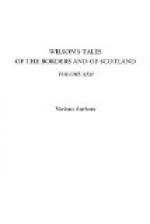Perhaps she was not versed in the ways of the world; but whether so or not, the difference in effect would have been small; for what man, beloved by a woman, ever yet pled his cause before his mistress without other than a wise man for his client?
“And if it is your wish, my dear Rachel,” he continued, “the inscription shall be erased, and replaced by the name of Rachel Grierson. What say you?”
His hand was held out for that acceptance which betokened consent. It was accepted; yes, and more, His arms were next moment around her waist; the heart of the yielding girl beat rarely, the wistful face was turned up as even courting his eyes, the kiss was impressed;—why, more, Rachel Grierson was surely Walter Grierson’s, and he was hers, and surely to be for ever in this world.
Rachel was now in that state of mind when the pleasantness of a contemplated object excludes any inquiry whether it is true or false, good or evil; and, in spite of Paul’s fatalism, she was satisfied that it was with Walter’s own free will that he had done what he had done, and said what he had said. The changed inscription on the locket, and the delivery of that pledge to her, would complete the vowing of the troth whereby she was to become his wife. Entirely ignorant of what had taken place between the nephew and the uncle, by means of which she might have been able to analyze his conduct, she had only the closeting of Mr. Ainslie and Walter to suggest to her that the young man’s sudden declaration was the result of his knowledge that she was to be sole heiress. The heart that is under the influence of love, as we have hinted, is too credulous to the tongue of the lover to doubt the sincerity of his professions. So all appeared well. The motives in action were adequate to the will of the parties who used them; and as she felt that her love was in the power of herself, so she could not doubt that Walter’s affection was the result of his approval of her good qualities. Paul was now no longer an oracle. She would be pleased to have an opportunity of showing him that his genius lay more in his fingers than in his head. She had now, however, something else to do. She went to her father’s room. He was in one of those reveries to which, as we have said, all the thinking of the extremely aged is reduced, when the world and its figures of men and women, its strange oscillations and changes, its passions, pleasures, and pains, seem as made remote by the intervention of a long space—dim, shadowy, and ghost-like. It is one of the stages through which the long-living must pass, and, like all the other experiences of life, it is true only to one’s self—it cannot be communicated by words. “Old memories are spectres that do seem to chase the soul out of the world,”—an old quotation which may be admitted without embracing the metaphysical paradox, that “subjective thought is the poison of life,” or conceding the sharp sneer of the cynic—




